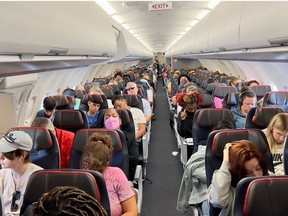
Article content
Whoever said: “It’s not the journey, but the destination”, surely never endured a red look next to a snorer. After a recent long-haul economy flight, I discovered why the military uses sleep deprivation as a torture technique. In addition to the jet lag, my lower back was hurting and I’m pretty sure I pulled something out after loading my (probably overweight) bag into the overhead bin.
Advertisement 2
Article content
But there’s a lot we can do to mitigate the effects of travel, especially if we’re willing to prepare. We consulted with a variety of experts for tips on how to make traveling less taxing on the body.
Article content
The most obvious problem travelers face is immobility. When we are sitting on a plane, in a car or at a desk, our shoulders and chest are hunched forward and the hip flexors remain in one position for a long time.
“Everything becomes tense, so you can feel stiff and sore from sitting like that for hours,” says Taylor Ethans, owner of Calgary’s StretchLab.

The solution is to take frequent postural breaks and stretch to relieve muscle tension. StretchLab, a new facility in Calgary, offers one-on-one assisted stretching sessions with a flexologist.
Regular stretching reduces muscle and joint pain and increases range of motion and flexibility. Learning what stretches to do can determine how you feel after leaving tight spaces.

Another victim of travel is digestive problems. Registered dietitian Rory Hornstein advises creating a diverse community of gut microbiomes through diet a month before your trip.
Article content
Advertisement 3
Article content
“I tell people to focus on consuming 30 different types of plants a week: vegetables, fruits, seeds, herbs, spices, nuts and legumes. That can optimize intestinal health and reduce the risk of intestinal infections,” he says. Additionally, Hornstein points to some evidence that taking a specific probiotic strain (saccharomyces boulardii) a week before traveling may help reduce the risk of traveler’s diarrhea.
Another way to prepare your body is to adjust your sleep schedule before your trip. If you’re heading east, try moving your bedtime and wake-up time earlier. If you are heading west, delay your bedtime to better acclimate to the new time zone.
On the way
Whether you’re stuck on a long-haul flight or a long road trip, there are two important things to do: move as much as you can and drink plenty of water.
Jim Chung, Air Canada’s chief medical officer, highlights the importance of regular movement: “It’s crucial to get up, stretch and move regularly.”
“You need to get your blood flowing and stay hydrated so you don’t get dehydrated.”

As for deep vein thrombosis, Dr. Chung says the risk is low in healthy people. If you have a chronic medical condition, are obese, or are pregnant, consult your health care professional before traveling.
Advertisement 4
Article content
StretchLab members can access their app with hundreds of pre-recorded stretching videos that you can do anywhere.
Body and mind
We know that mental health is just as important as physical health, so recognize the stress that comes with days on the road and prepare for unfamiliar environments.
Airports are chaotic, so arrive with plenty of time to comfortably check your luggage and navigate security wait times. At Calgary International Airport, security checkpoints can be booked in advance through YYC Express. Walking (sometimes long distances) through an airport can be exhausting for those with mobility issues. Passengers in need can take advantage of wheelchair services offered by airlines.
Once on board, anyone suffering from anxiety, claustrophobia or turbulence can find help on the screen in front of them.
“Air Canada has added new products to our in-flight entertainment, such as a partnership with Apple Fitness. There are modules on meditation and stretching, plus Audible podcasts on meditation, as well as relaxing sounds and radio that you can listen to,” suggests Dr. Chung.
Advertisement 5
Article content
Arrive and adjust
Upon arrival, try to adapt to the local time as soon as possible and avoid rich and heavy meals your first few days.
“Following social queues like having dinner at 6 p.m., even if it feels like two in the morning, is a way to trick yourself into adapting faster to that time zone. Getting natural sunlight into the eyes will also help speed up adaptation,” says Dr. Chung.
One of the best things about traveling is the food. But it’s hard to get all the fiber we need on the go, which can lead to constipation.
“If you can’t eat all those plant foods, maybe carry around psyllium husks, chia seeds, or ground flax to be as consistent as possible with your fiber intake,” Hornstein recommends.
To prevent or reduce the risk of traveler’s diarrhea, there are oral vaccines, such as Dukkoral, that travelers can take beforehand. But you’ll need to talk to your doctor ahead of time because the vaccine requires two doses, the last of which must be administered a week before travel to be effective.
Despite the risks of stomach problems or tiredness, the benefits of traveling often outweigh any short-term inconveniences and illnesses.
Advertisement 6
Article content
“Most people experience dramatic improvements when they are on vacation. A lot of this has to do with the gut-brain connection because a happy, relaxed brain means a happy, relaxed gut. If used as preparation before vacation, these strategies will allow them to make the most of their free time,” says Hornstein.
Affordable travel hacks
Sleep: Prevent light from leaking into your hotel room by using a trouser hanger with clips to hold the curtains.
Sound: Block out noise with upgraded earplugs, like EARPEACE, that are comfortable, reusable, and better at silencing noise.
Sox: Compression stockings help increase circulation when sitting for long periods.
Stretching: Take advantage of the escalator steps to stretch your calves.
Article content
